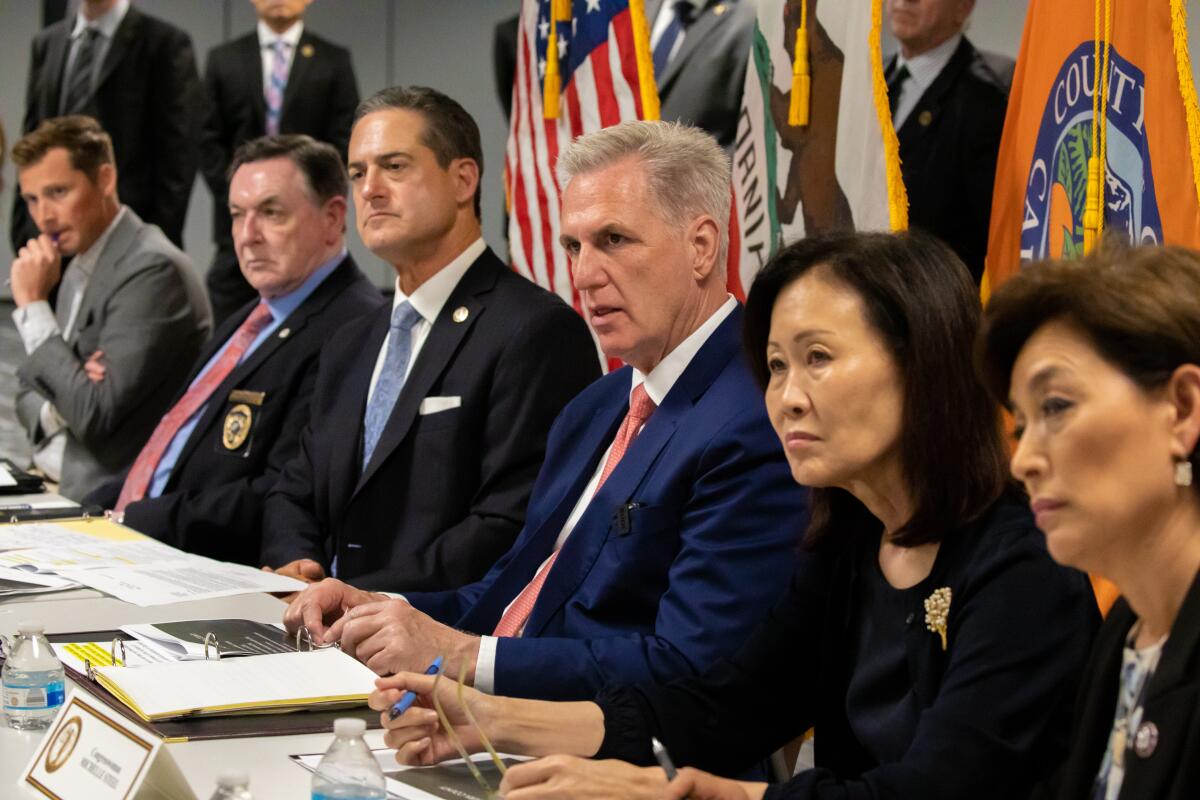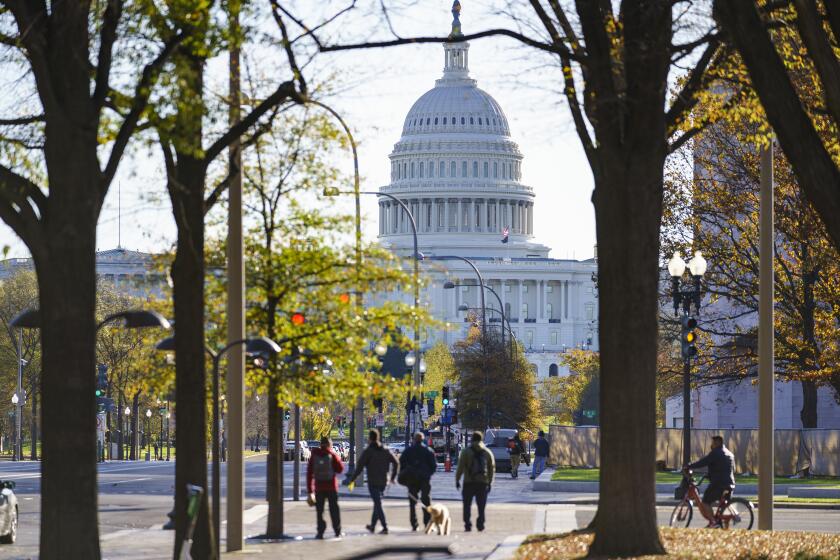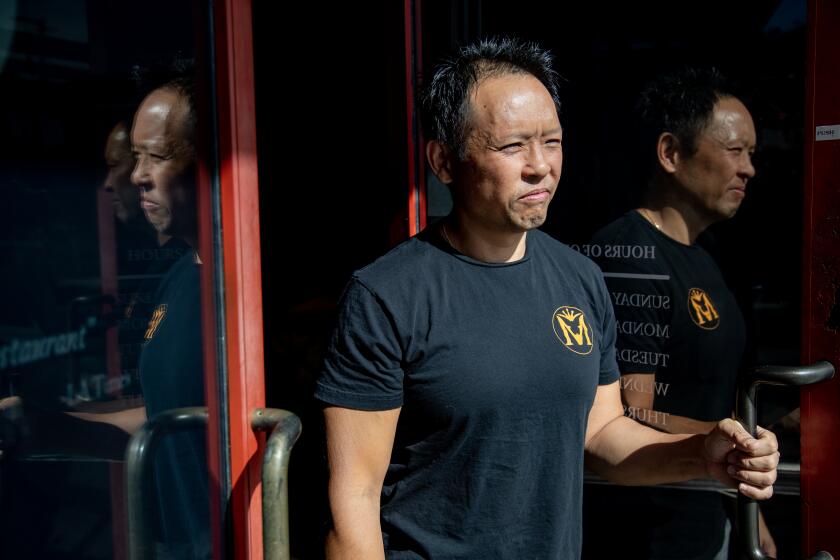McCarthy visit to Orange County highlights GOP focus on immigration and crime

A camouflage-clad mannequin sat on a table where Republican House Speaker Kevin McCarthy met with officials about recent home invasions in Orange County.
The prop was meant to draw attention to claims that Chileans entering the United States through a loophole in the immigration system are donning specialized suits that resemble foliage, hiding near homes and breaking in — typically from a second-story balcony — before making off with cash, jewelry and other high-value goods.
“There’s no consequences for these people when they get caught,” McCarthy said during a news conference Friday at the Orange County district attorney’s office, where he was joined by several Republican members of Congress from Southern California.
It was a rare public appearance for McCarthy in California but outside of his Bakersfield-based district. And it demonstrated that with Republicans’ narrow control of Congress in jeopardy next year, the party’s leaders are emphasizing border control and public safety as they try to appeal to affluent suburbanites in traditional conservative strongholds like Orange County that have grown more moderate and are critical to their path to victory.
Appearing alongside McCarthy were GOP Reps. Michelle Steel of Seal Beach, Young Kim of Anaheim Hills and Ken Calvert of Corona, all of whom face competitive races in 2024 to hang on to Southern California swing seats that will help determine control of Congress.
Several congressional contests in Southern California could determine whether Democrats win back control of the U.S. House of Representatives.
While polling shows economic concerns are paramount in voters’ minds in California and across the nation, messaging about crime and immigration helped GOP candidates win competitive congressional districts during the 2022 midterm election and increased support among some liberal-leaning voter blocs — notably Asian Americans — in former President Trump’s unsuccessful reelection bid two years earlier.
Such messaging could be especially effective in traditionally Republican regions that voted for Democratic presidential candidates when Trump was the GOP nominee, said David Wasserman, a congressional forecaster for the nonpartisan Cook Political Report, which rates nine of the California’s 52 congressional districts as competitive in the 2024 election, the most of any state in the nation.
“It’s a strategic overture to swing suburban voters, especially women, who might personally dislike Trump but could be open to voting for a Republican on other issues issues including illegal immigration and crime,” he said. Republicans “know they need to hold these seats to hold the House.”
The event highlighting Orange County home invasions took place hours before McCarthy headlined a high-dollar fundraiser focused on protecting vulnerable California members of Congress, including Steel and Calvert. Donors contributed up to $100,000 to attend the gathering at the exclusive Pacific Club in Newport Beach, which was closed to news media.
In front of the cameras, McCarthy focused on a niche issue that has attracted bipartisan concern and allowed him to highlight immigration and crime: the problems Orange County prosecutors are encountering with a visa-waiver program that allows people from participating countries to travel to the United States for 90 days or fewer without obtaining a visa.
Dist. Atty. Todd Spitzer said the Chilean government has refused to provide criminal histories of their citizens who are entering the country under the program, making it difficult to prosecute members of the alleged crime ring he blamed for recent home invasions. McCarthy threatened to block money for the visa waiver program unless the Biden administration bars Chileans from entering the country through the visa program without a background check.
Though concerns about the Chilean visa situation have drawn concerns from Democrats as well as Republicans, fears about immigrants and crime have long been central to GOP campaigns across the nation, often successfully. Years of polling show voters view Republicans as being more stringent on justice issues. But polling in California also shows that voters are not as focused on these issues as their counterparts in other parts of the country.
While crime was among the top five priorities mentioned by Californians in a Public Policy Institute of California survey released this month, it was far behind the economy, homelessness and housing.
Still, crime fears play particularly well in Orange County.
Republicans, who have been largely focused on inflation, have seized on crime as a key issue in the final weeks leading to Tuesday’s midterm election.
During last year’s race for district attorney, incumbent Spitzer branded himself early on in his campaign as a law-and-order candidate. His messaging, which included the slogan #NoLAinOC, focused on punishing criminals to prevent Orange County from becoming like Los Angeles. He pummeled his progressive challenger in the primary and avoided a November runoff. Spitzer alerted McCarthy to the home-invasion robberies tied to Chilean crime rings and appeared alongside the members of Congress on Friday.
Jack Pitney, a political science professor at Claremont McKenna College, said public safety was a big issue starting in the late 1960s because violent crime rates had doubled. Since then, crime has reached historic lows, though there have been upticks in certain categories, which is why such arguments are more dependent on “individual horror stories rather than overall trends.”
The same holds true for immigration, added Pitney, who was a Republican for decades until Trump’s election in 2016. An influx expected by a recent border policy change never materialized, but pictures of undocumented people crossing the border still resonate with voters.
“It takes time for perception to catch up to the data,” Pitney said. “People are in the suburbs because they are afraid of the cities. I say that as a suburbanite. Orange County and surrounding areas tend to be pretty conservative on these issues despite their votes in recent presidential elections.”
Part of this messaging is aimed at Asian Americans, a fast-growing voter bloc that could tilt races in California, especially in critical Orange County swing seats.
The county’s prosecutors have started charging some defendants arrested in the home burglaries with hate crimes for allegedly targeting wealthy Asians. Such sentencing enhancements can lead to longer prison terms. Spitzer called the move an “aggressive legal theory” that he hopes will get legislators’ attention.
Karthick Ramakrishnan, a UC Riverside political science professor who studies Asian American voters, said this is a novel approach — when attacks on Asian Americans surged after the pandemic outbreak, Democrats framed the incidents as hate crimes while Republicans described them as law-and-order issues. He added that the tactic may be successful.
“Fear works,” he said. “While the truth may be complicated in terms of what is responsible for an increase in crimes — even if crimes are increasing from historic lows — it almost doesn’t matter. Perception matters.”
More to Read
Get the L.A. Times Politics newsletter
Deeply reported insights into legislation, politics and policy from Sacramento, Washington and beyond. In your inbox three times per week.
You may occasionally receive promotional content from the Los Angeles Times.














